Graham Reid | | 5 min read
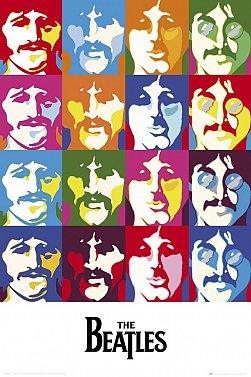
The discovery last week of a previously unknown Beatles' studio album from 1968 – recorded at EMI Studios in New Delhi (formerly known as Delhi) in India – has prompted the band's many researchers and experts to reassess the Beatles' catalogue.
And it has sparked excitement among fans that the recordings – 14 songs, only three previously familiar but on the Rishikesh album in very different versions – because there is an already planned commercial release of the “Rishikesh Album” in 2018.
The background to this recording is as interesting as the music itself, which in some places is unusual, unexpected and innovative. And often quite unlike anything else in their catalogue.
It is well known that in February '68 the Beatles – smarting from the critical drubbing for the McCartney-directed cinema verite film The Magical Bicycle Tour – retreated to an ashram in the hilltop town of Rishikesh in Northern India.
Here they would study meditation and cosmic consciousness with the Indian guru, mystic and charlatan Maharishi Maurice Bhagwan-Ji (more commonly known as the Maharishi or Maurice B-Ji).
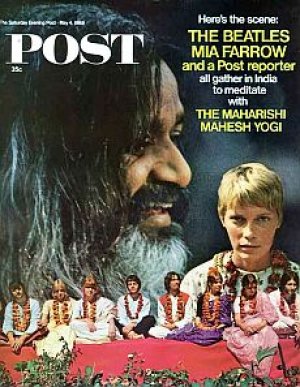 However after two months
of sitting around and thinking, the three remaining Beatles – Ringo
having earlier gone back to Britain complaining of the lack of Wimpy
Burgers – discovered the Maharishi (more commonly known as
Maha-Rishi-Rishi Maha-Ha-Ha) had shown unnatural sexual interest in
one of the women on the ashram.
However after two months
of sitting around and thinking, the three remaining Beatles – Ringo
having earlier gone back to Britain complaining of the lack of Wimpy
Burgers – discovered the Maharishi (more commonly known as
Maha-Rishi-Rishi Maha-Ha-Ha) had shown unnatural sexual interest in
one of the women on the ashram.
It is believed that woman was Prunella Farrow, sister of the thin and boyish actress Mia Farrow. Prunella was known to be a sexual athlete with the morals of a goat. She would entertain the Maha and other men in her room and rarely "come out to play" (as John Lennon would later write) or appear for meditation classes.
When Lennon confronted the Maharishi (more commonly known as Maurice Bee-Ji) about his prurient interest in her, he denied everything, even when Lennon and McCartney pressed the matter, and his head, against a wall.
Unpersuaded by the denials and cries for help by the Maharishi (more commonly known as Dave), the three Beatles then de-camped to Mumbai (formerly known as Delhi).
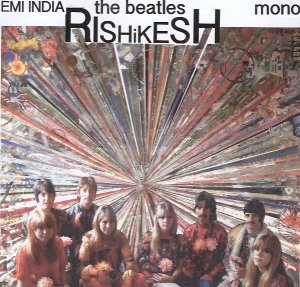 There they spent a few
days with their wives and partners in the famous and prohibitively
expensive Taj Mahal Palace Hotel with friends like fellow evacuee
Donovan. He had been at the Rishikesh ashram because he mistakenly thought it was a mediation seminar which might have been helpful
because he was in hefty copyright litigation with his manager Gypsy
Dave.
There they spent a few
days with their wives and partners in the famous and prohibitively
expensive Taj Mahal Palace Hotel with friends like fellow evacuee
Donovan. He had been at the Rishikesh ashram because he mistakenly thought it was a mediation seminar which might have been helpful
because he was in hefty copyright litigation with his manager Gypsy
Dave.
From recently uncovered accounts in the Mumbai EMI office, it seems the three Beatles telephoned their replacement drummer Richard Starr and invited him – in a contractual obligation manner – to come back to India from his holiday at a Butlins retreat near Brighton-on-Sea.
And so the four Beatles convened for two days of spontaneous recording at the EMI Studios in Delhi (formerly known as Goa).
The results of these 12-hour days of jamming -- but also serious recording -- were uncovered just last week when EMI India cleared out a warehouse in Mumbai (formerly know as Calcutta).
Unusually -- among the many documents found there along with a single copy of the album in a paper sleeve -- is a sign-off on the album's release by all four Beatles. (Lawyers say some of the signatures are rather slurred).
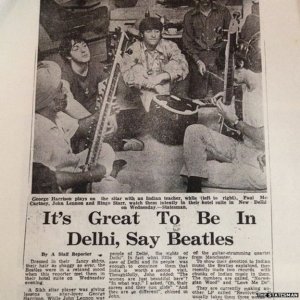 The record came to light
in a clean-out of the EMI Mumbai offices where it was discovered with
relevant paperwork behind an old fridge.
The record came to light
in a clean-out of the EMI Mumbai offices where it was discovered with
relevant paperwork behind an old fridge.
All other copies of Rishikesh (more correctly "RISHiKESH" according to the cover) were believed lost in The Great Fire of '76 in the city's Warehouse District which also destroyed all copies of David Bowie's ambient drone album Tamboura Tamboura also recorded in Bombay (aka Mumbai).
The contents of the Rishikesh recordings are quite extraordinary: among them are a few songs which would become familiar on a later album simply entitled The Beatles (also know as The White Album) but most are entirely new songs.
Among the recognisable songs are Lennon's Child of Nature melody which he would later reconfigure in his solo career as Jealous Guy, and also his Dear Prunella (“don't you open up your thighs”). The latter was addressed to Prunella Farrow.
But it is the new songs on the Rishikesh sessions which are quite remarkable: McCartney leads a darkly meditative piece about indigestion entitled Why Did I Do It On The Riverbank; Harrison offers a rockabilly song (Get Out Get Out But Get Back In) and a massive and vaguely familiar ballad Wonderful Wall (“after all, you're a wonderful wall”); Lennon has a searing Enough Enough/He's So Light (which seems addressed to Maha-Etcetera) and Mr Ringo – aka Mo-Starr of the gangsta rap group in the late Nineties -- gets a solo spot on an angry rocker called Home Home Gemme Home.
Three of the other songs are embellished by a small Indian ensemble.
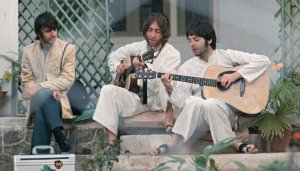 The closing track is the
oddest of all: It is McCartney and Lennon together singing Harrison's
Within You Without You over musical hall piano which neatly segues
into McCartney's When I'm Sixty Four and ends with mocking laugher
(as per Sgt Pepper). But in the run-out groove you can hear
Harrison's voice as he storm into the session.
The closing track is the
oddest of all: It is McCartney and Lennon together singing Harrison's
Within You Without You over musical hall piano which neatly segues
into McCartney's When I'm Sixty Four and ends with mocking laugher
(as per Sgt Pepper). But in the run-out groove you can hear
Harrison's voice as he storm into the session.
It is hard discern what he is shouting but an initial hearing suggests when it is played backwards it sounds something like, “You fookinfookuhas, you fookeen cunss . . .”
In a statement Sir Richard Starr says he has “no recollection of this album at all” and calls to Paul McCartney's London office proved fruitless.
“Mr Paul, he no here now,” said an unidentified woman. “He maybe no come here again. Someone tell me maybe he dead again.”
The Beatles' rare Rishikesh album in expected to get commercial release – after litigation – in early 2018 and will come as a 15-CD box set with photos, a 1200 page booklet of memorabilia, a recently signed photo by Maurice Bee-Ji (who died in 2008) plus a free copy of the vinyl version of the record.
The vinyl will come in a replica of the cheap paper-thin sleeve designed in Mumbai (formerly known as Hamburg) by Astrid Krishna, the photographer friend from the Beatles' days in Germany.
One Beatles expert who has heard the album, the late Ian MacDonald, said yesterday that “the discovery of this music is like finding another book of The Bible or a musical Rosetta Stone”.
“It is thrilling and will doubtless engage scholars and fans for decades. It's just a pity the music is so mundane.
“It really does sound like the kind of thing the boys might have done over a few days to get away from wives and girlfriends who were out shopping for silk and saris.
“Its all tosh, frankly. But fascinating nonetheless.”
For five other rare Beatle albums see here, and also this about the impending reissue of The White Album.
For other articles along these lines check out Absurd Elsewhere here.

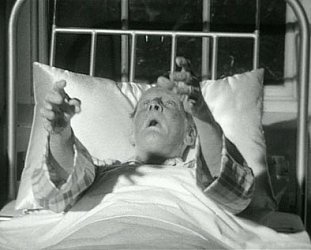

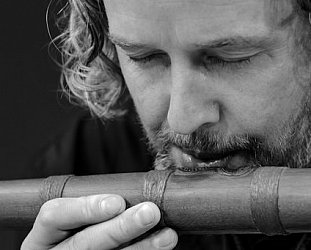
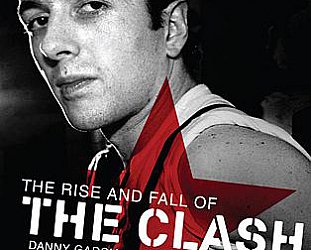
Pedro the Swift - Aug 1, 2017
Tosh indeed! GRAHAM REPLIES: As you say, but deliberately so . . .
Savepost a comment